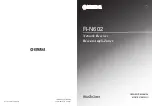
Caution: Read this before operating your unit.
iv
En
■
Notes on remote controls and batteries
•
Do not spill water or other liquids on the remote control.
•
Do not drop the remote control.
•
Do not leave or store the remote control in the following
conditions:
–
places of high humidity, such as near a bath
–
places of high temperatures, such as near a heater or stove
–
places of extremely low temperatures
–
dusty places
•
Insert batteries according to the polarity markings (+ and -).
•
Change all batteries if you notice the operation range of the
remote control narrows.
•
If the batteries run out, immediately remove them from the
remote control to prevent an explosion or acid leak.
•
If you find leaking batteries, discard the batteries
immediately, taking care not to touch the leaked material. If
the leaked material comes into contact with your skin or gets
into your eyes or mouth, rinse it away immediately and
consult a doctor. Clean the battery compartment thoroughly
before installing new batteries.
•
Do not use old batteries together with new ones. This may
shorten the life of the new batteries or cause old batteries to
leak.
•
Do not use different types of batteries (such as alkaline and
manganese batteries) together. Read the packaging carefully
as these different types of batteries may have the same shape
and color.
•
Before inserting new batteries, wipe the battery compartment
clean.
•
Keep the batteries in a location out of reach of children.
Batteries can be dangerous if a child were to put in his or her
mouth.
•
If the batteries grow old, the effective operation range of the
remote control decreases considerably. If this happens,
replace the batteries with new one as soon as possible.
•
If you plan not to use the unit for a long period of time,
remove the batteries from the unit. Otherwise, the batteries
will wear out, possibly resulting in a leakage of battery liquid
that may damage the unit.
•
Do not throw away batteries with general house waste.
Dispose of them correctly in accordance with your local
regulations.
Bluetooth
•
Bluetooth
is a technology for wireless communication between
devices within an area of about 10 meters (33 ft) employing the
2.4 GHz frequency band, a band which can be used without a
license.
Handling
Bluetooth
communications
• The 2.4 GHz band used by
Bluetooth
compatible devices is a
radio band shared by many types of equipment. While
Bluetooth
compatible devices use a technology minimizing the
influence of other components using the same radio band, such
influence may reduce the speed or distance of communications
and in some cases interrupt communications.
• The speed of signal transfer and the distance at which
communication is possible differs according to the distance
between the communicating devices, the presence of obstacles,
radio wave conditions and the type of equipment.
• Yamaha does not guarantee all wireless connections between
this unit and devices compatible with
Bluetooth
function.






































